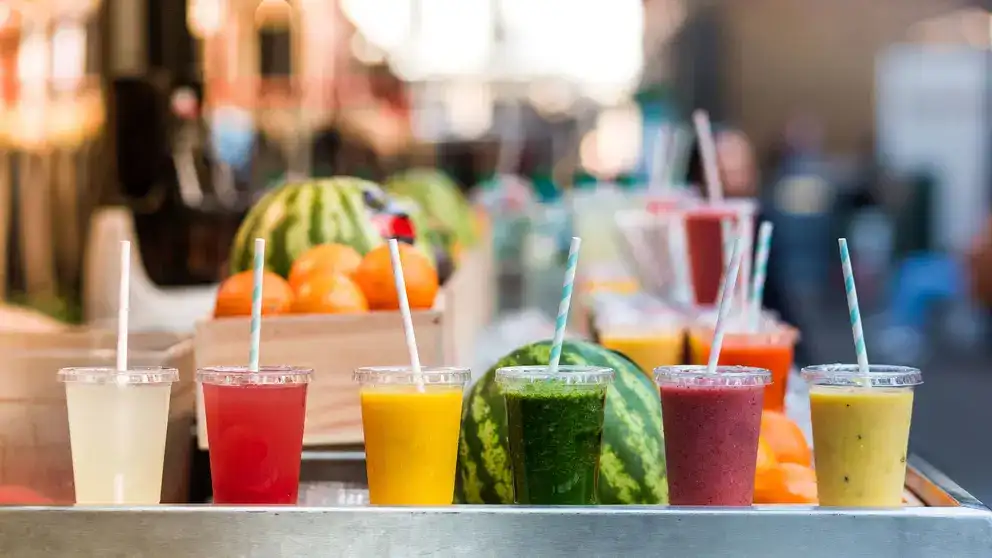Juice was pretty simple when I was a kid. My parents gave me apple or orange juice for a boost of vitamin C. Sure, they knew it had sugar, but they mostly worried about that in terms of dental cavities. Now we know there are other important reasons to be concerned about how fruit juice operates as a sugar-conveyance system.
Consuming too much sugar is linked to an increased risk of heart disease, stroke, type 2 diabetes, dental cavities and some types of cancer.
Amount of sugar in juice
All fruit juice — whether it's apple, orange, grape or a fancy blend such as peach-mango-blueberry — is high in sugar. An eight-ounce serving of juice and cola both contain about 30 grams of sugar on average — that's almost eight teaspoons.
Plus, most commercial juice eliminates wholesome fruit parts like skin and pulp — important sources of fibre and nutrients. It's better to eat whole fruit instead, to get more fibre and cut down on sugar.
Consider this: You aren't likely to eat three apples in one sitting, but it's easy to drink the equivalent in eight ounces of juice. With a sugar avalanche such as that, your body doesn't care where it comes from.
Sugar in orange juice vs. cola
Yes, fruit juice contains "natural" sugar — but that does not make it healthier than the sugar in cola. In fact, the World Health Organization classifies the sugar in juice with "free sugars," just like the sugar in soda.
Heart & Stroke recommends that people reduce intake of free sugars to less than 10% of total calories — and ideally less than 5%. For an adult consuming 2,000 calories daily, that's no more than 50 grams (or 12 teaspoons) of free sugars per day from all sources — including candy, baked goods, soda or juice. It's even less for kids — maybe eight or nine teaspoons.
Children consume more juice than any other age group, which is problematic if it displaces other nutritious foods. Canada’s food guide recommends making water your drink of choice and the Canadian Pediatric Society and Dietitians of Canada recommend limiting juice and offering water instead.
There is one bright spot: Fruit juice offers some nutrients. Studies show drinking no more than five ounces a day is linked to a lower risk of heart disease and stroke. So a small amount of fruit juice seems to be OK, but too much sugar from all sources — including juice — is linked to poor health outcomes.
Vegetable variations
What about commercial vegetable juice? Options such as the traditional savoury tomato-based concoction have just two teaspoons of sugar for eight ounces, but a whopping 650 milligrams of sodium. That's not a nutritious swap.
More recently, vegetable juice has been reinvented to include a nutritious array of cold-pressed elixirs that are low in sugar and have no added salt. Celery-parsley tonic, anyone? People are investing in cold-press masticating juicers, and juice bars are popping up across the country, offering an array of single-serve bottles in the $10 range.
Is it nutritious to sip a beverage made from leafy greens, celery, cucumber and ginger? Sure, if you can afford to. It's definitely a better choice than sugary fruit juice. Just watch out for high-sugar vegetables as ingredients (carrots, sweet potatoes, beets) or vegetable juice blended with fruit for palatability.
Cold-pressed juices are said to be more nourishing than traditional commercial juices from concentrate because they undergo less processing and are not heat-pasteurized. I haven't seen any clinical studies ably comparing the nutritional benefits, so exact measures are not available.
Ignore the hype
A note of caution: Excessive juice consumption can pose special dangers to people who are on blood thinners or have kidney disease. Speak to your doctor before consuming a lot of juice, no matter what kind.
Finally, ignore the marketing hype around juice. Juice will not detox your body, boost your immune system or cure cancer. There's no scientific evidence that juice is any better than eating fruit or vegetables. Though a small amount of juice can be part of a healthy diet, you can save money and time in the kitchen — and reduce the risk of consuming too much sugar — by simply eating fruits and vegetables instead.
- Learn more about healthy eating to reduce your risk of heart disease and stroke.
This is adapted from an article first published in The Washington Post.
